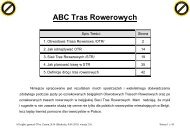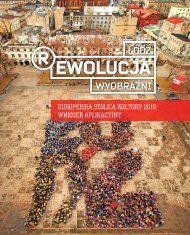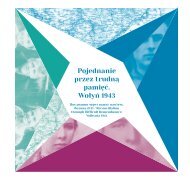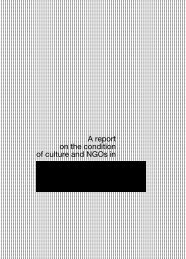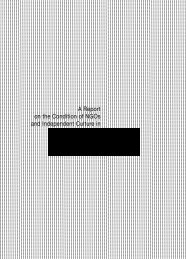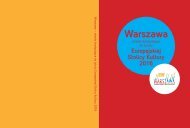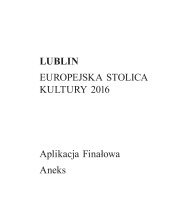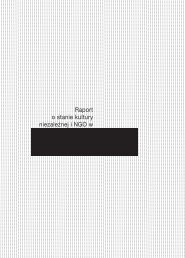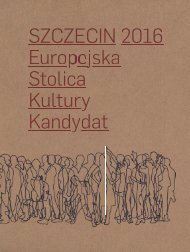Lublin 2016 â Appendix - Kultura Enter
Lublin 2016 â Appendix - Kultura Enter
Lublin 2016 â Appendix - Kultura Enter
Create successful ePaper yourself
Turn your PDF publications into a flip-book with our unique Google optimized e-Paper software.
THEME /CULTURES IN DIALOGUE/<br />
The idea of Cultures in Dialogue will be a central theme of cultural development in the decade of 2010-<br />
2020. It is closely related to our proposals for <strong>2016</strong> when a Polish city will host the European Capital of<br />
Culture. It reflects the diversity of <strong>Lublin</strong>, its geographic position at a crossroads of cultures and our belief<br />
that the dialogue of all the cultures converging here is essential to the city’s search for a better life.<br />
Cultural Development<br />
Strategy<br />
AIM /TO MAKE CULTURE PART OF EVERYONE’S LIFE/<br />
The aim of the cultural strategy is that culture - understood in its broadest sense - should be a valued<br />
part of everyone’s life.<br />
PROGRAME FRAMEWORK /CITY IN DIALOGUE/<br />
The thematic pillars of European Capital of Culture <strong>2016</strong> we see as perfectly mirroring our cultural<br />
specificity, as well as corresponding to the universal challenges of today and tomorrow. These pillars<br />
further branch into the fundamental programming axes of this strategy. And thus:<br />
City and Region - we see as a challenge arising from the fact that a considerable portion of the urban<br />
community maintains strong family and cultural links with the whole <strong>Lublin</strong> region, which abounds<br />
in different historical, ethnic, religious and environmental traditions nurtured in the villages, former<br />
country estates and noble manor houses, in small towns and cities. We want all these people to have<br />
their say in culture, while still cherishing their identity and being able to take pride in it, and enriching<br />
the urban cultural landscape by integrating it with the region.<br />
At the same time we recognise a universal need for the city to restore its position of a bona fide region’s<br />
leader, serving the surrounding region and its people. We want to overcome the creeping egocentricity<br />
of large cities by building transparent and partner relations with the neighbouring region’s<br />
communities. We believe that this is also a way to establish and enhance the cultural identity of <strong>Lublin</strong><br />
and Lubelskie.<br />
Remembrance and Anticipation - we see as tools for the reviving of multi-generation memory and<br />
the rebuilding of historical awareness, both of them inspiring courage and provoking future-oriented<br />
thinking. It helps bring back a living memory of the past city grandness; reconcile ourselves with the<br />
disasters and tragedies of our history; understand the sources of our culture, in order to respect cultural<br />
heritage and be able to continue it and hand it down to our successors. This is a creative form of<br />
opposition to amnesia resulting from the funnelling of human needs to mere consumption.<br />
We want the celebration of the 700th anniversary of city rights to be not only an invitation to pondering<br />
upon the local history but also the opening of a new era, a breakthrough stimulus boosting the<br />
city and its further urban development.<br />
Facing East - is understood as the need for re-discovering the cultural values of eastern Europe and<br />
their inclusion in the domain of the European culture. This is a challenge of our times ensuing from<br />
the transformation of the early 1990s that enabled us to re-establish the ties broken by the many decades<br />
of the post-Yalta political order. This is a chance for two rich cultural zones to come together so<br />
that Europe is able to „breathe with both lungs” again.<br />
76



